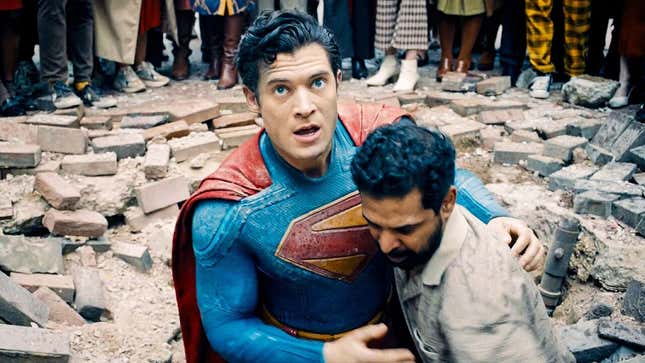
James Gunn’s Superman has officially had the best opening weekend of the Man of Steel’s film career, and with millions of people seeing David Corenswet don the red cape, there’s a lot of debate surrounding the movie. Are DC Comics movies back after floundering for a decade? Can you kickstart a new shared cinematic universe without having to retread all the origin stories? And, hilariously, is it a political agenda to care about other people? Yes, that’s the level of culture war nonsense we’re dealing with in 2025. Now, you don’t even have to have an inclusive cast of diverse heroes to get slapped with the “woke” stamp; you just have to fundamentally believe that people are worth saving.

For those condemning Superman as supposedly the latest example of Hollywood churning out “woke” ideology, one sticking point is Gunn’s assertion that Clark Kent himself is an immigrant in America and that his experience as an alien who has wound up on this planet and still seeks to do good on principle speaks to something we have “lost.” The usual suspects, like Fox News, lost their shit at the suggestion that the hero who symbolizes “Truth, Justice & the American Way” might not fuck with a modern-day political climate in which one side revels in using systemic power to push other people out of their homes and the history books. You also had ex-Superman actor Dean Cain weighing in, for some reason, about how he believed the film’s “political” messaging would hurt its success. Well, now that the movie is out, the debate has evolved to whether or not Superman is overtly criticizing Israel’s attacks on Palestine, and whether its portrayal of villain Lex Luthor as a rich, abusive man-baby using social media to spread propaganda is meant to be a commentary on anyone specific in the world today. The truth is likely far less nefarious than a right-wing grifter would have you believe: when the world has reached comic book levels of evil, comic book stories about heroes doing genuine good start to feel a little too pointed and relevant for people who think the dystopian hellscape we live in is the world functioning as intended.
Unlike the Man of Steel iteration of Clark Kent, Superman leans into a hopeful vision of its hero. This guy wants to save everyone he can, and the movie makes a point of showing him going to great lengths to protect the people and animals of Earth. One of the standout moments in the movie is when Clark, in the midst of a much bigger battle, saves a small squirrel. Superman doesn’t trade lives. Everyone is worth saving, whether they’re a person or a little rodent. He initially does this because a damaged message from his parents, recorded before they sent him from his doomed home planet of Krypton, seemed to instruct him to be humanity’s protector. But once the message was repaired, it’s revealed that, in this version of events, Clark was sent to the planet to rule over it like a dictator. Nevertheless, he makes his own decision to commit to the mission he started: to be humanity’s protector. But he’s not “of this world,” so Lex Luthor and his ilk conspire against our hero and use propaganda to try and turn the public on him. That’s pretty much the immigrant experience in America.
The core conflict of Superman is refreshingly simple. Clark cannot fathom how geopolitics could be more important to anyone than saving the lives of innocent people. An early interview between him and Lois Lane escalates because she repeatedly pokes at him for not saving people “the right” way. This principle extends to him stopping the country of Boravia from invading its neighbor, Jarhanpur. Though these places are fictional, the parallels between these events and the real-world conflict between Israel and Palestine aren’t subtle. Some debate whether or not this was actually Gunn’s intention or if it’s merely happenstance that the film’s geopolitical conflict mirrors a real one, but that hasn’t stopped people from taking this to mean the movie is pro-Palestine or, more specifically, anti-Israel.
As some critics have pointed out, Superman could very well be about Palestine, but it could also be about Ukraine. The truth is the film’s fictional framing is non-descript enough that it can be interpreted as being about many things. My cynical read is that it could give DC some plausible deniability to talk about these kinds of conflicts without having to make a big public statement, but whatever the authorial intent is, the fact that viewers are coming away from it wholeheartedly believing that it is “political” speaks to the truth of its story. It’s emboldening to those who want the world to be better, and uncomfortable for those who think things are just fine as they are. Lex Luthor is willing to spread lies, put people in danger, and even kill innocent people to maintain his power. Superman, having been on the receiving end of a torrent of abuse and distrust, still wants to believe in people, rather than falling into cynical detachment. When Lois asks how he can still think everyone he meets is “beautiful” after everything he’s been through, Clark says believing in people, even after you’ve been let down, is “punk rock.” If that’s “too political” for you, then that sounds like a you problem.